By Russell A. Berman · Wednesday, December 13, 2017 Telos 181 (Winter 2017): War and Civil War is now available for purchase in our store.
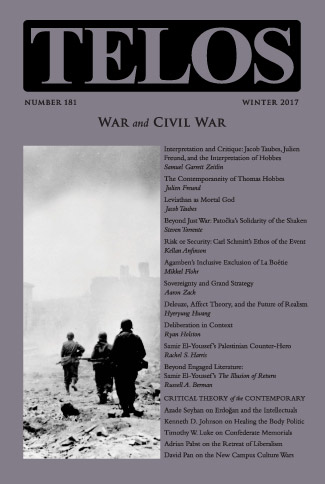 Consider the question: has American political life ever been as polarized as it is today? If the most appropriate answer is: yes, of course, in 1861, then the problem has been named and we are left with little comfort. The evaporation of anything like a bipartisan consensus in the political class leaves us staring at a battlefield, with few common bonds or shared attachments. Politics has become the internalization of war by other means. This is our version of the crisis of parliamentary democracy that Schmitt described in the Weimar years. Congressional Democrats are unwilling to cross the aisle to find room for compromise in the Trump era, but this only repeats the animosity among Republicans toward the Obama agenda eight years ago. Each party seeks its own advantage, which exclusively means the other party’s disadvantage, as the national good slips beneath the horizon. Each party focuses on mobilizing its base for votes and fund-raising, which means that each has an irresistible incentive to avoid solving those problems that are the most effective vehicles for rallying their supporters: when they held the majority, the Democrats preferred to keep the “dreamers” vulnerable, so as to be able to recycle them in future campaigns, just as the Republicans chose to punt on health care. Each issue is too successful in attracting voters, too valuable to give up. Consider the question: has American political life ever been as polarized as it is today? If the most appropriate answer is: yes, of course, in 1861, then the problem has been named and we are left with little comfort. The evaporation of anything like a bipartisan consensus in the political class leaves us staring at a battlefield, with few common bonds or shared attachments. Politics has become the internalization of war by other means. This is our version of the crisis of parliamentary democracy that Schmitt described in the Weimar years. Congressional Democrats are unwilling to cross the aisle to find room for compromise in the Trump era, but this only repeats the animosity among Republicans toward the Obama agenda eight years ago. Each party seeks its own advantage, which exclusively means the other party’s disadvantage, as the national good slips beneath the horizon. Each party focuses on mobilizing its base for votes and fund-raising, which means that each has an irresistible incentive to avoid solving those problems that are the most effective vehicles for rallying their supporters: when they held the majority, the Democrats preferred to keep the “dreamers” vulnerable, so as to be able to recycle them in future campaigns, just as the Republicans chose to punt on health care. Each issue is too successful in attracting voters, too valuable to give up.
Continue reading →
By Russell A. Berman · Monday, September 18, 2017 The following paper was presented at the conference “After the End of Revolution: Constitutional Order amid the Crisis of Democracy,” co-organized by the Telos-Paul Piccone Institute and the National Research University Higher School of Economics, September 1–2, 2017, Moscow. For additional details about the conference as well as other upcoming events, please visit the Telos-Paul Piccone Institute website.
Theodor Fontane, the master of German realist fiction, published his first novel, Before the Storm, in 1876. Set during the winter of 1812–13, in and around Berlin, it explores the decisive historical moment when Prussia changed sides—breaking out of its forced alliance with France in order to side with Russia in the anti-Napoleonic war. Yet the dialectic of the moment was such that Germans could join in the rout of the French while nonetheless embracing aspects of the French revolutionary legacy. Thus near the conclusion of the novel, the Prussian General von Bamme, commenting on social changes around him, a reduction in traditional structures of hierarchy, speculates, “And where does all this come from? From over yonder, borne on the west wind. I can make nothing of these windbags of Frenchmen, but in all the rubbish they talk there is none the less a pinch of wisdom. Nothing much is going to come of their Fraternity, nor of their Liberty: but there is something to be said for what they have put between them. For what, after all, does it mean but: a man is a man.” Mensch ist mensch.
Continue reading →
By Russell A. Berman · Monday, June 12, 2017 Telos 179 (Summer 2017) is now available for purchase in our store.
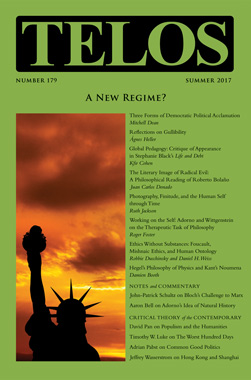 When the historian Ken Burns spoke at the Stanford University commencement last June, he delivered an exceptionally political address, including an attack on what he labeled the “Vichy Republicans.” Those Republican leaders who had not distanced themselves from candidate Trump, so Burns, were the equivalent of the Vichy French who collaborated with Hitler. That master metaphor, comparing 2016 to 1933, has continued into the new administration, with the anti-Trump camp labeling itself as “the resistance.” Despite Burns’s historiographical authority, one might question the validity of the underlying equation. No doubt the policies of the Trump administration are more conservative than those of Obama—hardly surprising—but the paradigms of the totalitarianism of the twentieth century are not necessarily the most adequate theoretical tools to analyze early twenty-first-century political phenomena. As emotionally satisfying as it may be for some to try to relive battles of earlier decades, Critical Theory ought to try to do better. We may very well be entering a different political era, a new regime, and not only in the United States. Can we describe it more effectively? When the historian Ken Burns spoke at the Stanford University commencement last June, he delivered an exceptionally political address, including an attack on what he labeled the “Vichy Republicans.” Those Republican leaders who had not distanced themselves from candidate Trump, so Burns, were the equivalent of the Vichy French who collaborated with Hitler. That master metaphor, comparing 2016 to 1933, has continued into the new administration, with the anti-Trump camp labeling itself as “the resistance.” Despite Burns’s historiographical authority, one might question the validity of the underlying equation. No doubt the policies of the Trump administration are more conservative than those of Obama—hardly surprising—but the paradigms of the totalitarianism of the twentieth century are not necessarily the most adequate theoretical tools to analyze early twenty-first-century political phenomena. As emotionally satisfying as it may be for some to try to relive battles of earlier decades, Critical Theory ought to try to do better. We may very well be entering a different political era, a new regime, and not only in the United States. Can we describe it more effectively?
Continue reading →
By Russell A. Berman · Monday, April 3, 2017 In addition to its main focus on original sin in modernity, Telos 178 (Spring 2017) features a special section of topical writing, introduced here by Russell A. Berman, that continues our ongoing commitment to setting forth a critical theory of the contemporary. Telos 178 is now available for purchase in our store.
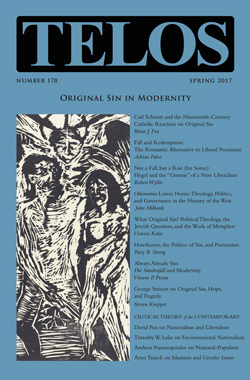 Not that long ago, debates over politics were anchored in a clear opposition between universalism and relativism. Proponents of an inclusive structure of, at least aspirationally, all states—the new world order—envisioned an unchallenged entrenchment of democratic capitalism everywhere. Where dictatorships endured, as in North Korea, they were treated as bizarre outliers, exceptions that proved the rule of the progress of mankind toward Kant’s perpetual peace. Universalist values held sway; ultimately all rights were to become human rights, due to all humans solely on the basis of their humanity, implying that rights pursuant to national citizenship, to membership in any particular national community, would dwindle in significance: no borders, no sovereignty, no traditions. However this conceptual expression of globalization faced sophisticated critics, variously postmodern, which treated that universalism with disdain and suspicion, insinuating to it an imperial agenda and offering an alternative program of multiplicity, diversity, and multipolarity. That was the historical moment of the theoretical opposition between Habermas and Derrida, the universality of communicative reason versus the insistence on difference. Inclusion and integration stood opposed to multiculturalism, as did generally applicable norms to the particular claims of local culture and tradition. Not that long ago, debates over politics were anchored in a clear opposition between universalism and relativism. Proponents of an inclusive structure of, at least aspirationally, all states—the new world order—envisioned an unchallenged entrenchment of democratic capitalism everywhere. Where dictatorships endured, as in North Korea, they were treated as bizarre outliers, exceptions that proved the rule of the progress of mankind toward Kant’s perpetual peace. Universalist values held sway; ultimately all rights were to become human rights, due to all humans solely on the basis of their humanity, implying that rights pursuant to national citizenship, to membership in any particular national community, would dwindle in significance: no borders, no sovereignty, no traditions. However this conceptual expression of globalization faced sophisticated critics, variously postmodern, which treated that universalism with disdain and suspicion, insinuating to it an imperial agenda and offering an alternative program of multiplicity, diversity, and multipolarity. That was the historical moment of the theoretical opposition between Habermas and Derrida, the universality of communicative reason versus the insistence on difference. Inclusion and integration stood opposed to multiculturalism, as did generally applicable norms to the particular claims of local culture and tradition.
Continue reading →
By Russell A. Berman · Wednesday, December 21, 2016 In addition to its main focus on nature and the Anthropocene, Telos 177 (Winter 2016) features a special section of topical writing, introduced here by Russell A. Berman, that continues our ongoing commitment to setting forth a critical theory of the contemporary. Telos 177 is now available for purchase in our store.
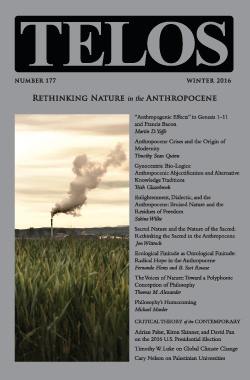 After a rancorous and ugly presidential campaign, in which vitriol and name-calling replaced discussion and policy, one moment stands out for its dignity: President Obama’s grace and generosity when he welcomed the president-elect to the White House. Above the fray and with a Lincolnian refusal of malice, he modeled a possibility of reconciliation and healing, as if citizens might genuinely respect each other, despite profound differences. That utopia will likely remain elusive, but the president’s bearing provides a lesson in civic virtue. Democracy can be coarse. He showed how it can be better. That legacy will be important. After a rancorous and ugly presidential campaign, in which vitriol and name-calling replaced discussion and policy, one moment stands out for its dignity: President Obama’s grace and generosity when he welcomed the president-elect to the White House. Above the fray and with a Lincolnian refusal of malice, he modeled a possibility of reconciliation and healing, as if citizens might genuinely respect each other, despite profound differences. That utopia will likely remain elusive, but the president’s bearing provides a lesson in civic virtue. Democracy can be coarse. He showed how it can be better. That legacy will be important.
Continue reading →
By Russell A. Berman · Wednesday, October 26, 2016 In addition to exploring the history and legacy of the George Circle, Telos 176 (Fall 2016) features a special section of topical writing, introduced here by Russell A. Berman, that continues our ongoing commitment to setting forth a critical theory of the contemporary. Telos 176 is now available for purchase in our store.
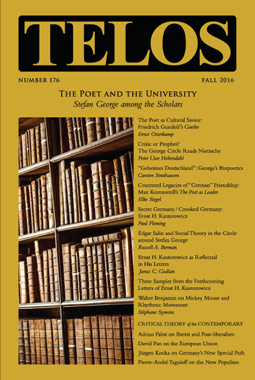 For nearly half a century, Telos has sustained a discussion of critical theory, broadly understood, encompassing various and diverse intellectual traditions and individual thinkers whose work points toward trenchant examinations of our contemporary society and culture. Articles published in the journal operate in various registers—philosophy, political theory, intellectual history, cultural criticism, or more generically “theory”—but despite this range of disciplinary idioms, they each contribute directly or indirectly to the ongoing elaboration of an examination of the present. Beyond their import as contributions to their respective academic fields, Telos articles enhance our ability to articulate the ongoing and constantly evolving critical theory of the contemporary. For nearly half a century, Telos has sustained a discussion of critical theory, broadly understood, encompassing various and diverse intellectual traditions and individual thinkers whose work points toward trenchant examinations of our contemporary society and culture. Articles published in the journal operate in various registers—philosophy, political theory, intellectual history, cultural criticism, or more generically “theory”—but despite this range of disciplinary idioms, they each contribute directly or indirectly to the ongoing elaboration of an examination of the present. Beyond their import as contributions to their respective academic fields, Telos articles enhance our ability to articulate the ongoing and constantly evolving critical theory of the contemporary.
Continue reading →
|
|
 Consider the question: has American political life ever been as polarized as it is today? If the most appropriate answer is: yes, of course, in 1861, then the problem has been named and we are left with little comfort. The evaporation of anything like a bipartisan consensus in the political class leaves us staring at a battlefield, with few common bonds or shared attachments. Politics has become the internalization of war by other means. This is our version of the crisis of parliamentary democracy that Schmitt described in the Weimar years. Congressional Democrats are unwilling to cross the aisle to find room for compromise in the Trump era, but this only repeats the animosity among Republicans toward the Obama agenda eight years ago. Each party seeks its own advantage, which exclusively means the other party’s disadvantage, as the national good slips beneath the horizon. Each party focuses on mobilizing its base for votes and fund-raising, which means that each has an irresistible incentive to avoid solving those problems that are the most effective vehicles for rallying their supporters: when they held the majority, the Democrats preferred to keep the “dreamers” vulnerable, so as to be able to recycle them in future campaigns, just as the Republicans chose to punt on health care. Each issue is too successful in attracting voters, too valuable to give up.
Consider the question: has American political life ever been as polarized as it is today? If the most appropriate answer is: yes, of course, in 1861, then the problem has been named and we are left with little comfort. The evaporation of anything like a bipartisan consensus in the political class leaves us staring at a battlefield, with few common bonds or shared attachments. Politics has become the internalization of war by other means. This is our version of the crisis of parliamentary democracy that Schmitt described in the Weimar years. Congressional Democrats are unwilling to cross the aisle to find room for compromise in the Trump era, but this only repeats the animosity among Republicans toward the Obama agenda eight years ago. Each party seeks its own advantage, which exclusively means the other party’s disadvantage, as the national good slips beneath the horizon. Each party focuses on mobilizing its base for votes and fund-raising, which means that each has an irresistible incentive to avoid solving those problems that are the most effective vehicles for rallying their supporters: when they held the majority, the Democrats preferred to keep the “dreamers” vulnerable, so as to be able to recycle them in future campaigns, just as the Republicans chose to punt on health care. Each issue is too successful in attracting voters, too valuable to give up. 





